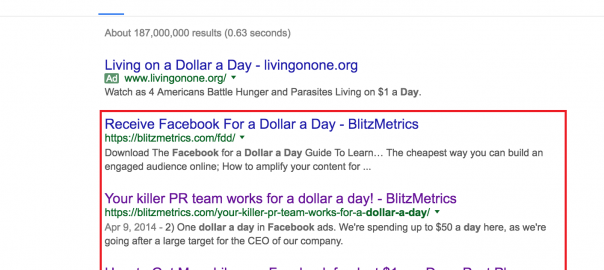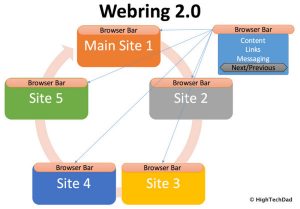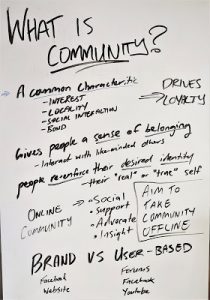If you’re a social media manager, you may see the world of search-engine optimization as arcane Google trickery mixed with quasi-technical babblings.
Allow me to show you how to make Google and the various folks who do SEO your buddies.
First, Google what you think you should be ranking on.
I did a search on “Facebook dollar a day” just now and was happy to see our articles in the first two organic results. There is one ad ahead of us, and one of the folks that we taught how to do Facebook ads is the third organic result.

Incidentally, if you want to see search results that are not biased by your search activity, make sure you add “pws=0” to your query string, which means “personalized web search” is off. The geeks out there will also note that even if you simulate logged-out search results, Google is still personalizing based on your location and user agent.

Oddly, we didn’t intentionally try to “SEO” for this or any other key phrases. That’s because SEO (getting rankings in search results) is the result of strong content marketing, not some activity you do.
Some people might say this is a competitive search because there are 187 million pages chasing this query (see first screenshot). And the SEO smarties will say that using the in-title tool yields a more accurate competitive set of 8.5 million (still a lot):

Back in 2007, we ranked No. 2 on Google organically for “Facebook ads.”
And while that might sound good, what actually happened is that I got overwhelmed with tons of random requests for consulting–mostly unqualified.
We had no lead magnets or filtering process, so I ended up doing a lot of free consulting to find out which leads were serious. So I learned the hard way that rankings are less important than driving high-quality traffic.
Here is a snapshot from our Google Search Console (used to be called Webmaster Tools), which should be part of your Google Analytics:

While the “dollar a day” tactic is something that I happen to think is important, it’s not in the top 50 things that people are searching for where we show up in Google. So the folks who are strong at SEO know that it’s smarter to listen to what the market wants than what you or the big boss happens to think is important.
In this case, you can clearly see that people want to know what social media consulting should cost. And if you do a search on Google for this, the type-ahead results confirm all flavors of this:

If you believe in the principle of amplification, which is to take a good thing and make it better, then you’ll use this signal to get more of what Google thinks you’re good at.
Here we are ranked No. 4 organically for “social media consulting fees”:

I had no idea there were so many people searching for this, and that if I made an effort to write a few more articles, we’d be able to “throw fuel on the fire” here.
So I went ahead and shared this article on Facebook:
And because it’s already worked well in search, it will likely work well in social–especially if I boost it for $ 1 per day against the audiences that Google Analytics already says have enjoyed this content. It’s like cheating.
I’ll bet that if you look at your search console, you’ll also find that what the market wants and what you think they want are two different things.
We could even update this article with quotes from other people that are authoritative–not just to send a stronger signal to Google, but to make a better article that deserves to rank for this search.
Use your social media superpowers to get other properties to talk about your content. They don’t have to link to you or even use your keywords as hypertext (the blue links)–social mentions do count, and building relationships count.
Simply sharing it on various channels, perhaps with a boost, will increase awareness, more people reading the content, more people linking to your content (if it’s worthy), and better search-engine rankings.
Thus, by simply doing your job in social, you’re helping your brand’s Google search results. And the person whose job is to do SEO should be producing great content for you and other webmasters, which helps your social results.
SEO, public relations, social media marketing, content marketing and word of mouth are increasingly becoming the same discipline. There are different tools and different channels, but in common is the production and sharing of content that is worthy of distribution.
Digital & Social Articles on Business 2 Community
(35)
Report Post







